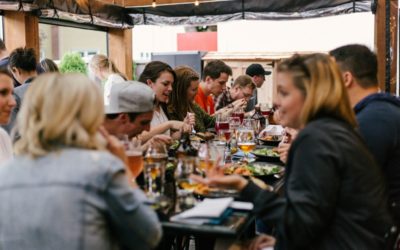 Social media has been shifting the way people gather and digest information for some time now. As a result, event planners can take advantage of these new behaviors and tools in a myriad of ways when promoting an event.
Social media has been shifting the way people gather and digest information for some time now. As a result, event planners can take advantage of these new behaviors and tools in a myriad of ways when promoting an event.
The following are a list of seven popular social media networks and some simple suggestions for how you can begin to incorporate them into your next event promotion:
1. Facebook
- Create a Facebook “event” to send to all fans. Attendees can see who is attending and allow them to identify good networking opportunities.
- Post updates asking for speakers, sponsor and volunteers.
- Post updates announcing and thanking speakers, sponsors, volunteers. Be sure to let potential sponsors know they will receive a mention on your Facebook page.
- Post updates asking audience what they would like to see and hear at the event. This type of crowd sourcing allows you to include the hottest topics at your event.
- Post photos from the event in a Facebook photo album. Attendees will love to look to see if they are in the photos from the event. As pictures are taken, photographer should tell attendees to look for them on Facebook. Attendees will enjoy tagging them and sharing them on their own Facebook page.
2. Twitter
- Encourage your audience to use the event #hashtag when tweeting about the event. Once they begin to use the hashtag, the conversation is then search-able by anyone wishing to read comments relating to your event.
- Post tweets asking for speakers, sponsor, volunteers.
- Post tweets announcing and thanking speakers, sponsors, volunteers.
- Post tweets asking your audience what they would like to see and hear at the event.
- Encourage attendees to tweet live during the event. Let everyone know it is not rude to tweet during presentations, in fact, it’s encouraged.
- Designate event personnel to tweet event announcements during the event.
- Ask attendees to tweet about breakout sessions and workshops.
- Use large monitors during event to allow all attendees to see Twitter conversation as it happens.
3. LinkedIn
- Create a LinkedIn Event and share it with your contacts and LinkedIn Groups.
- Share the event through your LinkedIn Status. All of your connections will see this message. Show committee and team members how to post updates in their profiles, as well.
- Post links to the event in your LinkedIn Groups. Groups have anywhere from dozens to thousands of members. Posting the event in a group allows you to reach potential attendees that you might not ordinarily reach by other methods.
- Start a group specifically for people interested in the event. Start discussions in the group about topics of the upcoming event, and all other details of the event.
4. YouTube
- Create a video announcing the event, and details of the event. Post the video on YouTube, Facebook, Twitter and your event website.
- Create a video announcing and thanking sponsors.
- Create short interviews of speakers to provide a sneak peek to your audience.
- Create video interviews of attendees and speakers during the event. Post them as soon as possible so attendees can watch and share them while still at the event.
- Upload the first few minutes of webinars created from breakout sessions to promote sale of webinars after the event.
5. Foursquare
- Create tips that users will see when they check in.
- Encourage users to add tips related to the event and location.
- Offer incentives to those visiting exhibitors to encourage users to visit exhibits.
- Hold special raffle for those who have checked in to the event.
6. Flickr
- Share photos from last year’s event on Flickr to help promote your event.
- Upload photos during the event. Let attendees know where to find the Flickr account to view photos.
7. Pinterest
- Create boards before the event relating to the event, such as vendors, speakers, workshops, etc.
- Create boards to be used for photos taken at the event.
- Boards can revolve around special activities held at the event.
- This is by no means an exhaustive list of strategies, but it is a good place to start. If you’re just beginning to use social media to market events, choose just a couple of the ideas above and try them out. You will soon find which strategies work best for you and your event.
Have you used social media to promote your events?




0 Comments